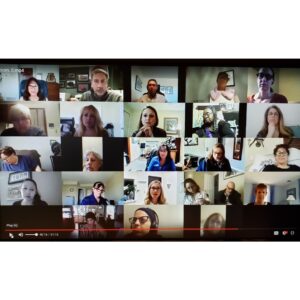 In an increasingly virtual world, many health-related support groups are moving online. But not all support groups are created equal—there are specific skills and strategies necessary for creating a safe, welcoming, and empowering environment.
In an increasingly virtual world, many health-related support groups are moving online. But not all support groups are created equal—there are specific skills and strategies necessary for creating a safe, welcoming, and empowering environment.
During the recent Pain Connection Chronic Pain Support Group Training, 22 individuals learned how to establish and run effective groups. Pain Connection support groups follow a specific model that emphasizes the importance of normalizing the pain experience, learning self-care techniques, and developing a multidisciplinary care plan.
The training met over Zoom on Tuesdays and Thursdays from March 30 to April 15. Each session featured a combination of presentations, discussions, and interactive modules like role-playing.
It was the first time the training was held virtually; typically, they are held in person.
“This was our eighth leader training and even though it was held virtually for the first time, we had an amazing mixture of health care professionals and peer leaders participate,” says Gwenn Herman, LCSW, DCSW, Clinical Director of Pain Connection. “The training and support groups are now international, as we had one person from Canada and another from Italy participate. Three new specialty groups will be developed from this group of leaders: a Spanish-speaking group, a group for people of color, and a creative writing group. We want to serve as many people with chronic pain and their loved ones as possible.”
Herman led the training alongside Cindy Steinberg, National Director of Policy and Advocacy, and Malcolm Herman, Director of the National Coalition for Chronic Pain Professionals and Providers.
At the closing of the training, participants shared their thoughts on the course.
“Just being with everyone was wonderful to hear everyone’s different perspectives and to not feel alone as we go on this journey,” said Kristina Knight, who will be starting a group in Colorado. “The concept and framework you’ve created are just amazing. The role plays made me nervous but were super helpful in putting my skills to the test!”
“I really enjoyed this training,” said Millie Quiñones-Dunlap, who is located in New York and plans to start a group there as well as a group for writers. “It was like a re-education to all that I learned surrounding my pain in the first place. I look forward to getting started.”
The training was free to individuals with chronic pain thanks to sponsorship from Amgen and Novartis, as well as Eli Lilly. To learn more about Pain Connection support groups, visit painconnection.org.
